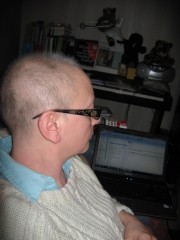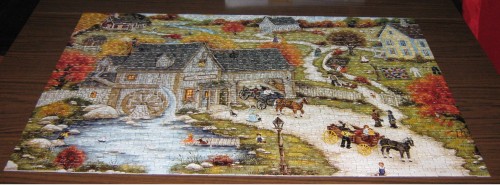One of my favourite hymns is Richard Gillard's Brother, Sister, Let Me Serve You, and at the moment it feels I am learning to 'live' it more fully...
Brother, sister, let me serve you
Let me be as Christ to you;
Pray that I may have the grace
To let you be my servant too
In a Protestant tradition that has emphasised how much more blessed it is to give than to receive, we sometimes become our own worst enemies, always wanting to serve others (an endeavour to fulfil the first two lines) and refusing to let others serve us. I have a sneaky suspicion those of us who are minister types are especially 'bad' in this respect - after all we called to serve the church aren't we. One of my lessons these past few months, and more especially this post operative phase, is to have enough grace to allow others to serve... to give me help and support, whether that is a lift, some hoovering, shopping or a shared cuppa. It is hard not to be Miss Flippin' Independent, hard not to devise means of doing things when there are people keen to help. I am trying (very!) and it is a good lesson to begin to learn. I'll always be more independent than most, but maybe, just maybe, a little more tempered by experience.
We are pilgrims on a journey
And companions on the road;
We are here to help each other
Walk the mile and bear the load.
Early in this particular journey two different people who have known me a long time, and know my tendency to self sufficiency offered words of wisdom that have stayed with me...
- Take care, and, when necessary, let others take care of you
- Keep the faith, and when you can't, let others keep it for you
I think I can say that I haven't reached a point of not 'keeping the faith' in so far as my belief and trust in God has never wavered, but there have been times when prayer has been impossible because I was too tired, too 'floppy', too 'brain mushed' or just didn't really know what or how to pray. Sometimes the early hours of the morning have been, and continue to be, times of fear and anxiety (it's not only children who see strange shapes in the shadows! Metaphorical shapes anyway). So it is that I treat the words from old friends (and new) as a promise:
I will hold the Christlight for you
In the night time of your fear;
I will hold my hand out to you
Speak the peace you long to hear.
Scripture tells us to rejoice with those who rejoice and to weep with those who weep. It is one of the odd aspects of being a minister that sometimes you do both on the same day, one minute conducting a funeral, the next celebrating a birth or a Baptism. The rough and tumble of life is joy and sorrow blended in varying proportions. Over the past years I've shared many extreme moments with other people - the privilege of being allowed to share their vulnerability and grief or their joy and delight. But it isn't just ministers who sign up for this, it's part of being committed to one another as part of Christian community...
I will weep when you are weeping,
When you laugh I'll laugh with you
I will share your joy and sorrow
Til we've seen this journey through
I like the way the song moves to its climax - focusing on the worship of God in Christ:
When we sing to God in heaven
We will find such harmony
Born of all we've known together
Of Christ's love and agony.
This harmony, this beautiful worship, arises out of the shared experiences in all their bittersweet authenticity, not despite them. I think that's important. There is a worship song that causes many people difficulty with its line "and in his presence, our problems disappear" because it imply isn't true; faith, and more specifically worship, may grant perspective, may give us the ability to face great trials with tremendous courage and tenacity, but sure as heck doesn't vanish them. The harmony that delights God arises from authentic Christ-centred living - which inevitably includes love and agony.
I miss being in church on a Sunday. Circumstances have conspired to keep me away since Christmas, yet even so I hear snatches of the 'music of worship' that arises in 'life in all its fullness.'
Finally the hymn ends as it begins, a re-statement or re-affirmation of the commitment to one another...
Brother, sister, let me serve you
Let me be as Christ to you;
Pray that I may have the grace
To let you be my servant too
May it be so, Lord, may it be so.

